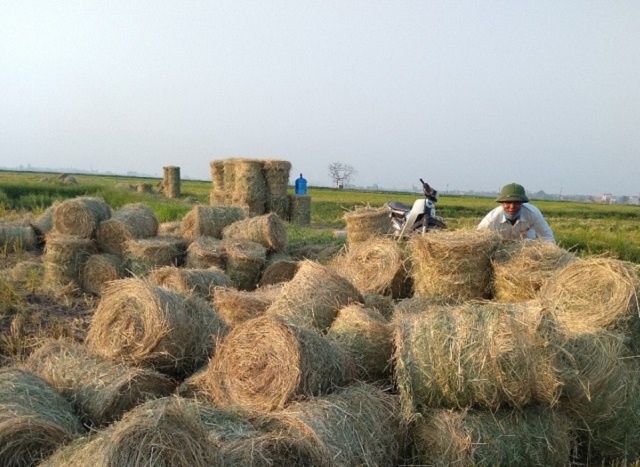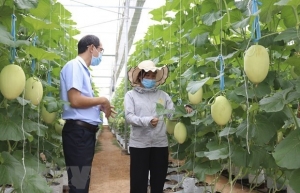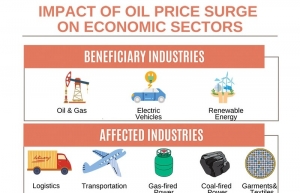Agricultural sector urged to scale up by-product use
Nguyen Huu Ninh, deputy director of the Department of Science, Technology and Environment under the Ministry of Agriculture and Rural Development (MARD), believes that by-products in the agri-forestry and fisheries sectors should be deemed renewable resources to bolster agriculture’s value chain and minimise waste.
Ninh made the remarks at the international workshop “Agricultural by-products – Renewable resources” hosted by the MARD in Ho Chi Minh City on September 30.
According to the MARD, the volume of by-products in the agricultural sector currently approximates 160 million tonnes, of which about 90 million tonnes stem from crop harvesting and agricultural processing, accounting for 56 per cent of the total; 62 million tonnes are generated in livestock breeding, equal to 38.7 per cent; six million tonnes is from the forestry sector, making up 3.7 per cent; and nearly one million tonnes, 0.6 per cent, is from the fisheries sector.
 |
| By using straw to feed cows, a household in Ba Vi district can save about $8,600 per year |
Annually, these by-products can supply about 43 million tonnes of organic fertiliser; 1.8 million tonnes of urea fertiliser; 1.6 million tonnes of superphosphate fertiliser; and 2.2 million tonnes of potassium sulfate fertiliser.
In animal husbandry, with about 84.5 million tonnes of waste discharged into the environment each year, only about 20 per cent is reused effectively (biogas production, composting, fishmeal among others), while the remainder is mostly unused.
| According to the MARD, the volume of by-products in the agricultural sector currently approximates 160 million tonnes. |
In farming, about 10 per cent of farming by-products are used as on-site fuel, 5 per cent as industrial fuel, 3 per cent as animal feed, while over 80 per cent is either discharged into the environment or burned, causing pollution.
Meanwhile, in the fisheries sector, by-product processing generates about $275 million currently, whereas given nearly 1 million tonnes of by-products in the sector, the amount of proceeds is expected to touch $4-5 billion through efficient technology use.
According to Nguyen Hong Long, director of the Centre for Creativity and Sustainability Study and Consultancy, the biomass potential of Vietnam’s by-products surpasses 160 million tonnes per year, generating $46.5 billion in value, generating jobs for 180,000 labourers, and bringing benefits to 13 million households and 900,000 food and drink trading units.
With just a marginal part of these by-products being tapped, there is a vast amount of waste.
Deputy Minister of Agriculture and Rural Development Tran Thanh Nam reported that there were several circular models linked to green growth, using by-products in the agri-forestry and seafood sectors as renewable resources.
Several businesses have successfully processed by-products into high-value items, such as Vinh Hoan JSC in the Mekong Delta province of Dong Thap, Vietnam Food and Sao Mai JSC. They use cutting-edge technology for by-product processing with products such as fishmeal or cooking oil widely used in the domestic market and for exports.
Deputy director Ninh from the Department of Science, Technology and Environment stressed the importance of incentive policies to encourage firms to engage in collecting, packaging, transportation, preservation and processing of by-products.
Bui Ba Bong, former Deputy Minister of Agriculture and Rural Development, raised the need to implement circular agriculture right at small farms, farmer households and cooperatives following a lasting traditional garden-pond-cage model.
 | Agricultural sector pushes green growth in 2021-30 action plan The Ministry of Agriculture and Rural Development has recently approved an action plan for implementing the goals, tasks and solutions of the National Strategy on Green Growth for the period of 2021-30, and vision to 2050. |
 | Manufacturers and retailers battling to stabilise product prices amid fuel hikes Businesses are scratching their heads over how to ensure freshly resumed production amid a series of obstructions, including hikes in prices of fuel, transportation, and input materials. |
What the stars mean:
★ Poor ★ ★ Promising ★★★ Good ★★★★ Very good ★★★★★ Exceptional
Related Contents
Latest News
More News
- Trung Nam-Sideros River consortium wins bid for LNG venture (January 30, 2026 | 11:16)
- Vietnam moves towards market-based fuel management with E10 rollout (January 30, 2026 | 11:10)
- Envision Energy, REE Group partner on 128MW wind projects (January 30, 2026 | 10:58)
- Vingroup consults on carbon credits for electric vehicle charging network (January 28, 2026 | 11:04)
- Bac Ai Pumped Storage Hydropower Plant to enter peak construction phase (January 27, 2026 | 08:00)
- ASEAN could scale up sustainable aviation fuel by 2050 (January 24, 2026 | 10:19)
- 64,000 hectares of sea allocated for offshore wind surveys (January 22, 2026 | 20:23)
- EVN secures financing for Quang Trach II LNG power plant (January 17, 2026 | 15:55)
- PC1 teams up with DENZAI on regional wind projects (January 16, 2026 | 21:18)
- Innovation and ESG practices drive green transition in the digital era (January 16, 2026 | 16:51)

 Tag:
Tag:


























 Mobile Version
Mobile Version